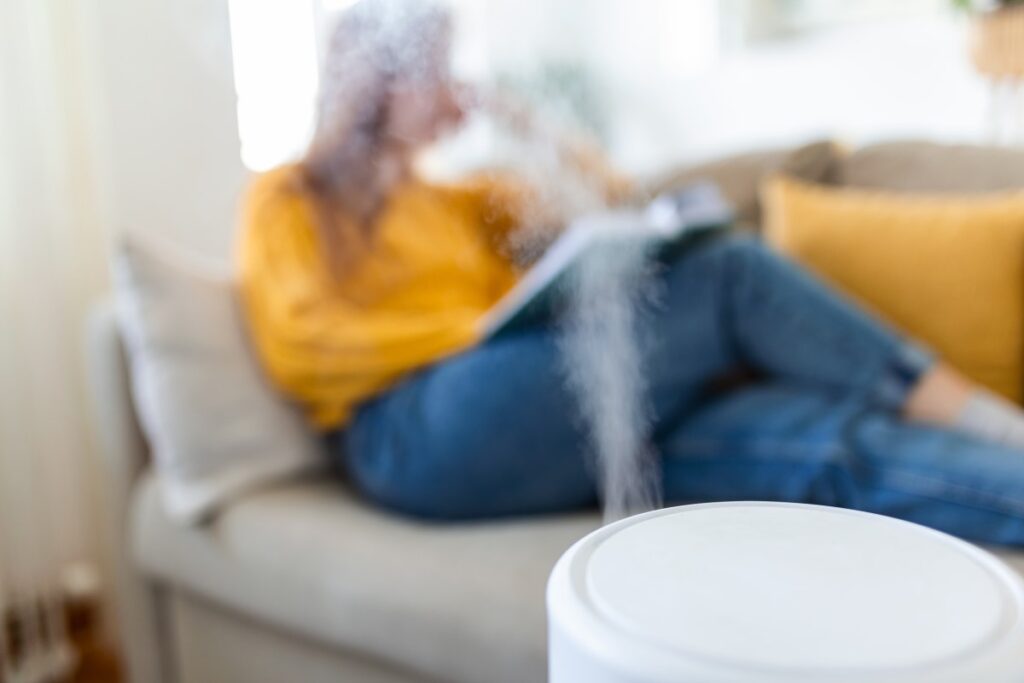According to various sources, including the Environmental Protection Agency, the ideal humidity range for a bedroom is between 30% and 50%.
It is important to maintain moderate relative humidity levels in your bedroom to ensure optimal sleeping conditions.
High humidity levels can cause mold growth and other health issues, while low humidity levels can cause dry skin, throat irritation, and other respiratory problems.
Therefore, it is recommended to keep the humidity level in your bedroom within the ideal range to promote a comfortable and healthy sleeping environment.
What Are Some Common Signs That The Humidity Level In My Bedroom Is Too High Or Too Low?
Here are some common signs that the humidity level in your bedroom is too high or too low:
- If you notice moisture on the outside of a glass after placing ice cubes in it, the humidity level is high.
- Difficulty breathing and sweating are common signs that the humidity level is too low.
- Low humidity can cause increased instances of static electricity, dried and cracking millwork, and paint.
- Signs of high humidity include visible condensation on surfaces like windows, mirrors, toilet basess, and pipes, as well as in your basement.
- Low humidity can cause wallpaper shrinkage, hardwood floor separation, drawer and cupboard warping, and more.
How Can I Measure The Humidity Level In My Bedroom And What Tools Do I Need?
To measure the humidity level in your bedroom, you can use a hygrometer, which measures humidity and temperature.
Hygrometers are easy to use and can be purchased at hardware stores or online.
Some hygrometers can also be connected to your smartphone or other devices to monitor humidity levels remotely.
If you don’t have a hygrometer, there are other ways to measure humidity, such as using a psychrometer or a sling psychrometer.
However, these methods are less accurate and require more effort.
Are There Any Specific Actions I Can Take To Regulate The Humidity In My Bedroom, Such As Using A Humidifier Or Dehumidifier?
Yes, there are specific actions you can take to regulate the humidity in your bedroom. You can use a humidifier or dehumidifier to control the moisture in the air.
Additionally, you can place bowls of salt in the room to absorb high amounts of humidity. Other ways to lower humidity in your home include turning up the AC, using exhaust fans, and venting your clothes dryer to the outside.
It’s important to maintain ideal humidity levels in your home to prevent mold growth and other health issues.
Can The Ideal Humidity Range For A Bedroom Vary Depending On Factors Such As Climate, Season, Or Location?
Yes, the ideal humidity range for a bedroom can vary depending on factors such as climate, season, or location.
While the Environmental Protection Agency recommends indoor humidity to fall between 30% and 50%, other studies suggest 40% to 60% is a better range. The ideal bedroom humidity can differ based on climate and temperature.
The optimal humidity for a house is 40~60%, and it is best to keep your living room, bedroom, and stairways around this humidity level. Humidity recommendations vary widely, and the ideal humidity level varies and is individual.
Therefore, it is important to consider the specific factors that may affect the humidity level in your bedroom and adjust accordingly to ensure optimal sleeping conditions.
Are There Any Additional Benefits Or Risks Associated With Maintaining A Specific Humidity Level In My Bedroom, Such As Improved Allergy Or Asthma Symptoms?
Maintaining a specific humidity level in your bedroom can have both benefits and risks.
The Mayo Clinic recommends that your home’s optimal humidity level be between 30% and 50% to prevent issues including dry skin, sinus discomfort, and itchy eyes. High humidity can result in condensation on surfaces, which can encourage the growth of dangerous germs, dust mites, and molds and cause respiratory issues as well as flare-ups of allergies and asthma.
Conversely, exposure to excessively low humidity levels can also cause health problems such as dry skin, itchy eyes, and a sore throat.
Maintaining healthy humidity levels in your home can make sleeping in your bedroom much more comfortable and can reduce allergies and minimize respiratory risk.







